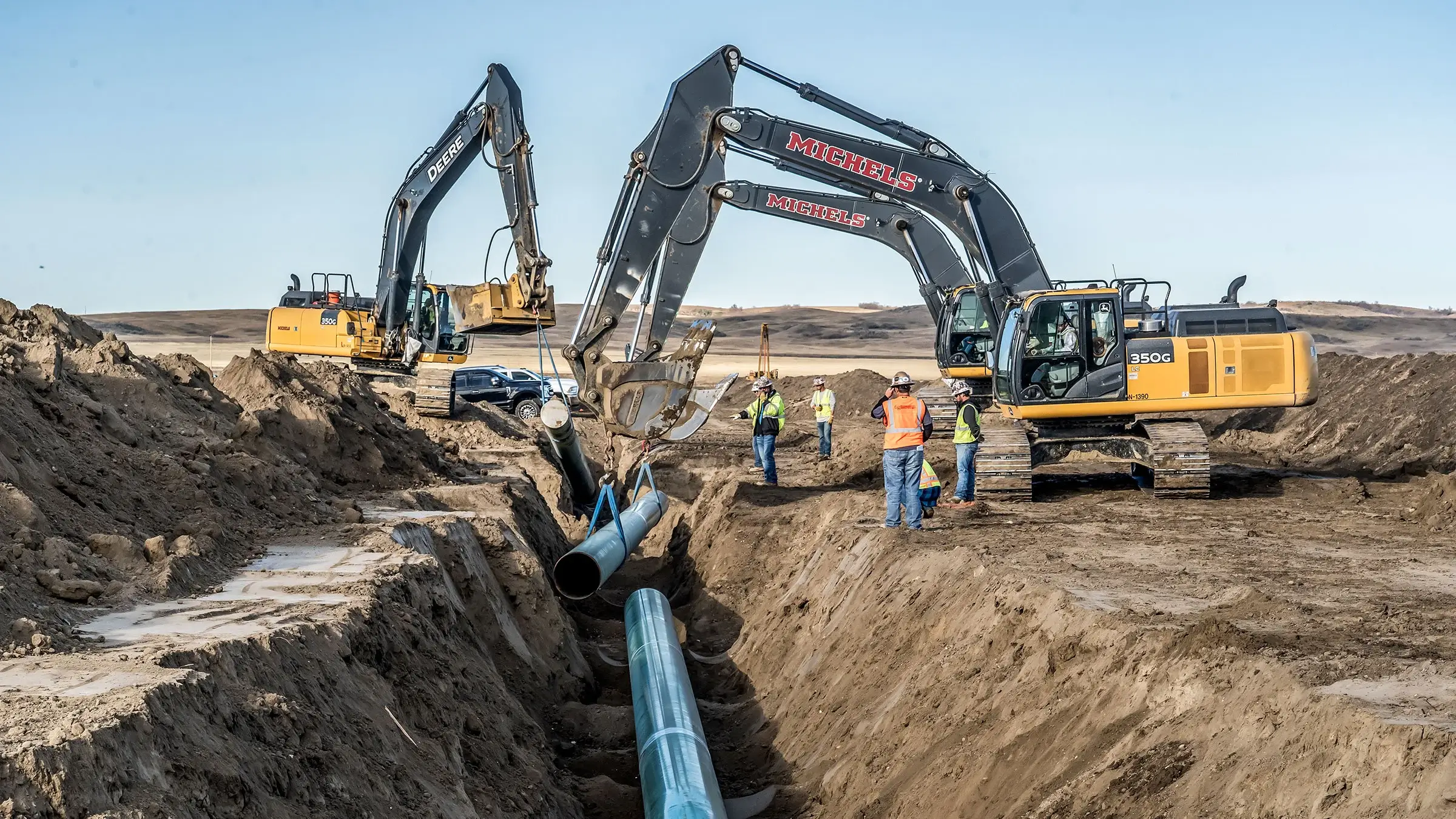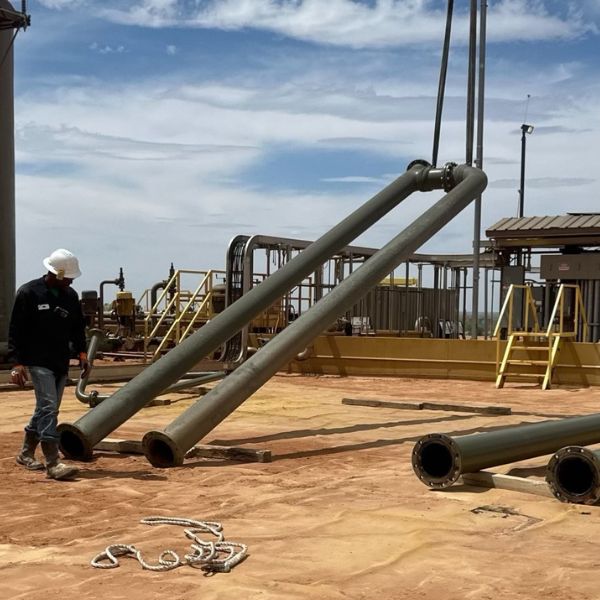The Vital Overview to Recognizing Pipeline Construction Providers and Their Importance
Pipeline Construction services are fundamental to the transport of crucial sources such as oil, gas, and water. These solutions include careful planning and execution, sticking to stringent safety and security and environmental criteria. As the sector adapts to contemporary challenges, recognizing its elements and ramifications comes to be increasingly crucial. What variables add to the growing significance of these services in today's economy? The adhering to sections will certainly discover these critical aspects.
Overview of Pipeline Construction Solutions
Pipeline Construction services encompass a range of activities crucial for the setup and maintenance of pipelines used to deliver various materials, including gas, water, and oil. These solutions are vital for guaranteeing the efficient and safe activity of sources from one place to one more. The process generally begins with extensive preparation and layout, which takes into consideration regulative requirements, environmental factors to consider, and logistical challenges.
Excavation and grading of the land are conducted to prepare the site for Pipeline installment once planning is full. This is followed by the actual laying of the pipelines, which includes welding or signing up with sections together to create a continuous circulation path. After installment, strenuous screening is carried out to assure honesty and safety. Maintenance services are additionally provided to address any type of issues that might arise with time. On the whole, Pipeline Construction services play a pivotal function in sustaining framework for power and water circulation.
Trick Parts of Pipeline Construction
An effective Pipeline Construction job depends on numerous essential components that assure the risk-free and effective installment of the Pipeline system. Detailed site assessments are essential, as they recognize the geographical and ecological elements that might impact Construction. Next, the choice of proper products, such as pipes and fittings, is crucial for safeguarding sturdiness and compatibility with the moved substances.
Progressed Construction techniques, including trenchless innovation and directional drilling, improve efficiency and lessen ecological influence. Reliable task management is an additional important component, working with labor, devices, and timelines to meet task objectives.
In addition, communication among stakeholders, consisting of engineers, professionals, and neighborhood authorities, assurances placement on project specifications and demands. Complete quality control actions throughout the Construction procedure make certain conformity with market requirements and optimize the Pipeline's operational life expectancy. Jointly, these components develop the backbone of an effective Pipeline Construction task.
Safety And Security Specifications and Regulations in Pipeline Construction

Regulative bodies, such as the Occupational Security and Health And Wellness Management (OSHA) and the Pipeline and Hazardous Materials Safety And Security Administration (PHMSA), set forth particular needs that regulate Construction techniques. These consist of procedures for tools use, worker training, and emergency feedback procedures. By carrying out these criteria, Construction business not only shield their employees but additionally safe and secure public depend on. Eventually, rigorous safety and security steps add to the long-term success of Pipeline jobs, ensuring they meet both operational and environmental expectations.
Ecological Factors To Consider in Pipeline Projects

Environmental considerations are important to the planning and implementation of Pipeline tasks. These projects must examine possible effects on ecological communities, water sources, and regional wildlife. Carrying out thorough ecological impact analyses (EIAs) is vital, allowing stakeholders to recognize and alleviate risks before Construction begins.
Safeguarding sensitive areas, such as environments and marshes, frequently calls for executing specific design features or alternate routing to minimize interruption. Additionally, Pipeline operators are charged with establishing techniques for avoiding spills and leaks, which can have terrible results on the environment.
Interaction with regional communities is crucial, as public concerns can lead to job modifications that improve ecological defense. Conformity with regulations established by environmental companies assures that tasks meet sustainability criteria, promoting a balance in between facilities demands and ecological preservation. Ultimately, addressing environmental considerations not just safeguards nature but additionally promotes community trust fund and job stability.
The Role of Technology in Pipeline Construction
Technology plays a crucial duty in contemporary Pipeline Construction, boosting effectiveness and accuracy. Advanced evaluating methods permit for precise preparation and implementation, lessening ecological effect and job delays. In addition, the combination of automation and robotics enhances operations, reducing labor prices and boosting safety and security on Construction websites.
Advanced Surveying Methods
Advanced evaluating description methods play a crucial function in the effective implementation of Pipeline Construction jobs. These approaches utilize advanced innovation to assure exact mapping and evaluation of the terrain where pipes will certainly be installed. Strategies such as Geographic Information Systems (GIS), LiDAR (Light Discovery and Ranging), and 3D modeling make it possible for designers to visualize and examine the landscape, determining environmental worries and prospective barriers. By utilizing these sophisticated tools, groups can improve accuracy ready and placement, considerably reducing the risk of mistakes throughout Construction. In addition, real-time information collection enables instant adjustments and educated decision-making throughout the project lifecycle. Eventually, these evaluating innovations add to boosted performance, security, and sustainability in Pipeline Construction initiatives.
Automation and Robotics

Economic Influence of Pipeline Facilities
Pipeline facilities plays a crucial duty in shaping regional economies and assisting in profession. By giving a reliable ways of delivering oil, gas, and various other commodities, pipes reduce transportation costs and boost supply chain performance. This infrastructure brings in financial investment, stimulates task development, and fosters economic growth in bordering locations.
The Construction and maintenance of pipes contribute substantially to local economic climates, creating various employment possibilities in different markets, from engineering to labor. The increase of work frequently causes boosted investing in regional businesses, additionally strengthening financial activity.
Additionally, pipes boost energy safety by ensuring a steady supply of sources, which is important for industrial operations and household requirements. As areas come to be interconnected through Pipeline networks, they access to more comprehensive markets, raising competition and economic strength. The economic impact of Pipeline framework is complex, influencing both prompt regional economic situations and more comprehensive regional growth.
Future Patterns in Pipeline Construction Services
The future of Pipeline Construction services is progressing in response to technical advancements, governing changes, and expanding environmental considerations. Developments such as drones and robotics are improving inspection and upkeep procedures, enhancing security and performance. Automation is positioned to lower labor expenses and raise accuracy in Construction operations. In addition, the increasing emphasis on sustainability is motivating firms to take on environment-friendly products and practices, lining up with global initiatives to minimize carbon footprints.
Regulative structures are also adjusting to deal with ecological impacts, pushing for better transparency and accountability in Pipeline tasks. Furthermore, the assimilation of wise modern technologies, consisting of real-time surveillance systems, is anticipated to boost the dependability and efficiency of Pipeline networks. As power needs change toward sustainable sources, Pipeline Construction solutions will likely see a surge in tasks connected to biofuels and hydrogen transportation. On the whole, these trends indicate a transformative more helpful hints duration for the Pipeline Construction sector, concentrated on development and sustainability.
Often Asked Concerns
What Kinds of Pipelines Are Commonly Constructed?
Numerous kinds of pipelines are frequently built, including oil, gas, sewage, and water pipelines - Pipeline Construction Services. Each offers unique purposes, facilitating the transport of important resources across regions while sticking to security and environmental guidelines
Exactly how Long Does a Common Pipeline Job Take?
The duration of a typical Pipeline job varies considerably, commonly ranging from several months to a few years. Aspects affecting this timeline consist of task complexity, regulative approvals, and environmental factors to consider that should be dealt with.
That Manages Pipeline Construction Companies?
Pipeline Construction firms are regulated by numerous government, state, and local agencies, including the Pipeline and Hazardous Materials Security Management (PHMSA) and state public utility compensations, making certain conformity with security and environmental criteria throughout the Construction procedure.
What Are Typical Materials Made Use Of in Pipeline Construction?
Usual products utilized in Pipeline Construction include polyethylene, pvc, and steel. Each product uses distinctive advantages such as resistance, sturdiness, and adaptability to deterioration, making them suitable for various applications in carrying liquids and gases.

Exactly How Are Pipeline Construction Prices Approximated?
Pipeline Construction expenses are estimated by analyzing factors such as product expenses, labor prices, task complexity, ecological factors to consider, and regulative needs (Pipeline Construction Services). Exact cost estimate guarantees reliable budgeting and task planning throughout the Construction process
Pipeline Construction services include an array of tasks important for the installment and maintenance of pipelines used to carry numerous substances, including water, gas, and oil. An effective Pipeline Construction job depends on numerous crucial elements that assure the effective and risk-free setup of the Pipeline system. Advanced surveying techniques play a necessary duty in the effective implementation of Pipeline Construction tasks. Various kinds of pipelines are frequently built, consisting of oil, gas, water, and sewage pipelines. Pipeline Construction prices are approximated by examining aspects such as product expenses, labor prices, task complexity, ecological factors to consider, and governing needs.